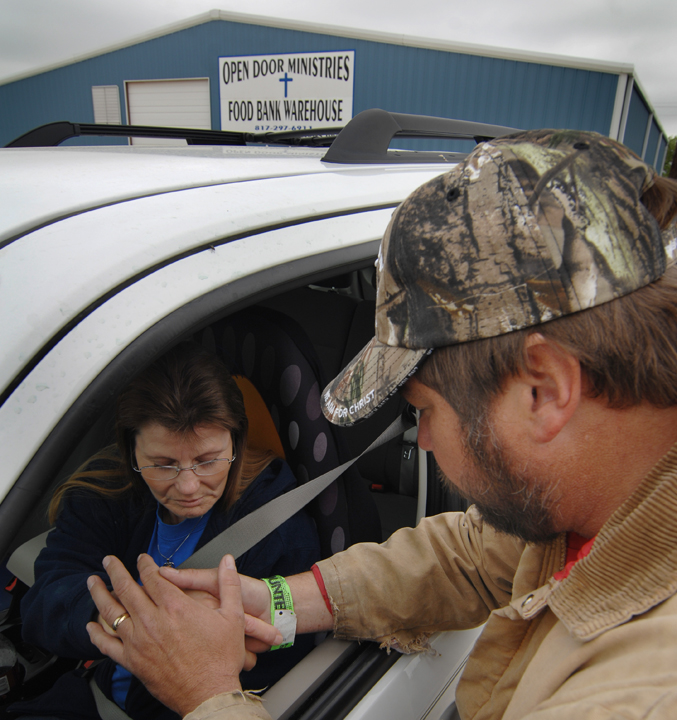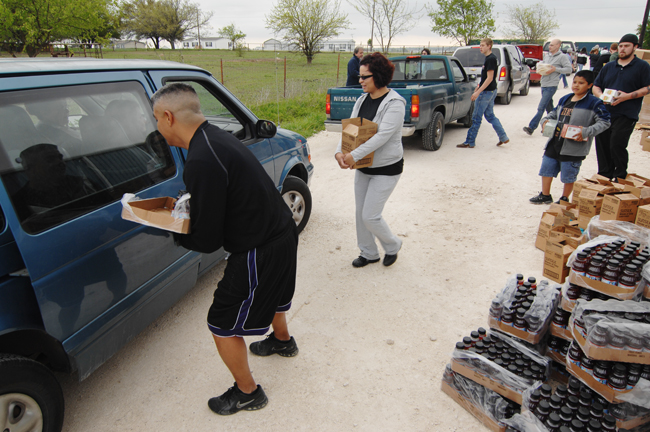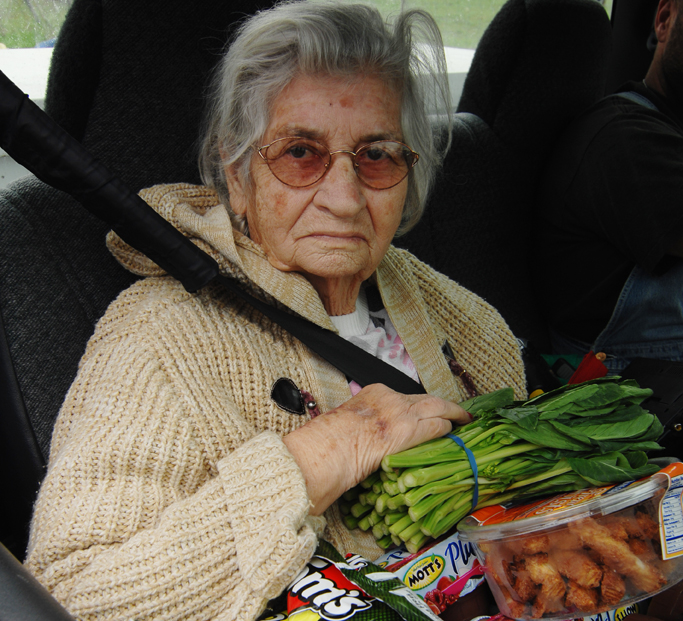The cars and pickup trucks are lined up for nearly half a mile on the farm-to-market road in Joshua. The first ones arrived at around 6 a.m. on this Saturday, and now, almost three hours later, it’s just about time for the cattle gates to open on the warehouse in the middle of the small compound at the front of the line.
 Open Door Ministries and its drive-through food bank are getting ready for another day of dealing with this country’s economic casualties. And what they are seeing, for the most part, is carload after carload of families with kids.
Open Door Ministries and its drive-through food bank are getting ready for another day of dealing with this country’s economic casualties. And what they are seeing, for the most part, is carload after carload of families with kids.
Pastor Andy Dally, an ex-bronc rider, moves among the crews who are preparing for the food giveaway, which the ministry does every two weeks. Some are cutting open boxes of groceries on a line of wooden pallets along an exterior wall of the warehouse. Others are inside in the “store,” arranging clothes and shoes that are also free to those who need them. When everything’s ready, Dally calls the workers together for a short prayer of thanks that, for one more day, the food bank has plenty to give to those who need it. Then they open the gates.
In the next two hours, more than 200 cars come through and get loaded up with canned goods, drinks, cakes, pasta, fresh vegetables, frozen sausages, toiletries, paper goods, and whatever else was donated in the past two weeks.
Until a year or so ago, Dally said, most of the food went to retirees trying to make ends meet on Social Security or was delivered to elderly shut-ins. These days the bulk of the cars belong to younger families.
“We were serving about 300 people every two weeks,” said Dally. “Now we serve 700, and those are mostly working class and working-class poor who’ve lost their jobs to the recession. They can’t feed their kids, so we try to pitch in the best we can.”
It’s a story being played out all over the United States. The stock market may be looking up, finally, but middle- and working-class folks are a long way from climbing out of the hole created when the economy crashed in mid-2008.
Jobs are still few and far between, and most that are available are part time or don’t pay much. Unemployment benefits are running out, and most of the families who lost their homes when Mom or Dad or both lost their jobs are still in financial trouble. A recent study noted that 4 million Americans have been out of work for more than a year — and 15 million have been out of work for more than six months, the most since the Great Depression. At a dozen local charitable agencies contacted by Fort Worth Weekly, the report was essentially the same: substantial increases in the demand for their services over the past year, while donations have been harder to come by because of the hit on middle-class contributors.
 With the recession hanging around as long as it has — and the job market recovering much more slowly than Wall Street — the effects on children in particular are becoming graver, according to numerous studies and the opinions of those who work with kids in many settings. The combination of economic and emotional stress has helped send child abuse and neglect rates climbing. In many instances, kids and their parents have had to move in with relatives, which creates a whole new set of stresses, or parents may have found themselves simply unable to provide food and shelter and had to farm their children out to other family members. Children’s health service providers are also overwhelmed.
With the recession hanging around as long as it has — and the job market recovering much more slowly than Wall Street — the effects on children in particular are becoming graver, according to numerous studies and the opinions of those who work with kids in many settings. The combination of economic and emotional stress has helped send child abuse and neglect rates climbing. In many instances, kids and their parents have had to move in with relatives, which creates a whole new set of stresses, or parents may have found themselves simply unable to provide food and shelter and had to farm their children out to other family members. Children’s health service providers are also overwhelmed.
Vicki Mize, emergency assistance manager for the United Way of Tarrant County, said the organization has seen “a tremendous increase, about 33 percent, in calls from grandparents and family members taking care of their relatives’ children in the first three months of 2010, [compared to] the same period in 2009. And what they tell us is that they are raising these kids because their parents can’t afford to raise them.”
That’s just one example, she said. “The recession is affecting kids in a million ways.”
Two years ago, Olga Gonzales and her family were living in their own small home in south Fort Worth, mortgage-free. Olga, then 44, and her husband Martin both had jobs — Martin’s in real estate, hers in the meat section of a grocery store — and it seemed like a good time to move. “With our two daughters becoming teenagers, [their first house] was feeling smaller and smaller,” she said.
They hired a contractor and started building a larger house. But then the real estate business started to drop off. Her husband didn’t tell her, Olga said, but he began using his credit cards as if he were still making money. The couple began to fight. “I know it affected my daughters to see us fighting, but we were starting to fall apart,” she said. Problems also developed with their contractor, who she said submitted inflated invoices, eating up a lot of the bank loan.
“I couldn’t just leave it unfinished,” she said, “so we sold our first home to make up the difference to finish it.”
Things went from bad to worse, however. The stress of discovering that her husband wasn’t making any money and his inability to find a new job led to more arguments and finally a separation. The new home was finished, only to be lost to foreclosure. So now Olga Gonzales is fighting the foreclosure while going through a divorce.
“My daughters lost the home they grew up in and then the home we were building for them,” she said. “And then the divorce. And now we live with my sister in Crowley.
“Everything changed for them,” she said. “They don’t say anything, but I know they feel it inside. Not having their dad hurts. Not having their own home hurts. And I cry all the time. Just not in front of them.”
Her kids are having a hard time making new friends in a new school, but Gonzales considers herself lucky that they are otherwise doing OK. “If I didn’t have my sister, we would have had to move into a one-bedroom apartment somewhere,” she said. “And there are not many good choices on what you earn at a grocery store.”
“That’s not unusual,” Mize said. “A lot of the grandparents and family members tell us that the kids are having trouble adjusting to not living with their parents, to moving to new schools, to being taken out of extracurricular activity. So we know kids are being affected deeply, even though we may not be keeping specific data on them.”
Overall, she said, calls for assistance at the United Way are up nearly 10 percent since the recession hit the Tarrant area just over a year ago, and calls from people who were formerly in the moderate-income range have more than doubled this year over last.
Similar increases in calls for assistance have been seen by other social service providers as well. The Tarrant Area Food Bank is providing 35 percent more meals at their pantries now than they were a year ago, and a third of the people served are children.
“In fiscal year 2008 we were serving 32,000 households per month,” said Andrea Helms, spokesperson for the food bank. “That’s just our pantries that provide fresh, frozen, and nonperishable food. In 2009 that figure jumped to 42,000 households, and so far this year we’re up 2,000 more. You’ve simply got more people falling further into poverty than they were. You had the working poor, who are now unemployed. You’ve got middle-class families now out of work and whose unemployment has run out.”
 Officials at the Salvation Army’s family shelter in Arlington expect to serve twice as many families this year than in 2009. In the last six months, the agency has distributed twice as many food boxes as it provided in the entire 12 months before that.
Officials at the Salvation Army’s family shelter in Arlington expect to serve twice as many families this year than in 2009. In the last six months, the agency has distributed twice as many food boxes as it provided in the entire 12 months before that.
At Fort Worth’s Union Gospel Mission, program director Betty McElroy said calls to the women and children’s programs have increased dramatically. “For every space to sleep, we have at least four or five people vying for that spot,” she said.
In the past two years, Edward Ramos has been one of the many people who used to give help to the less fortunate but then needed to ask for help himself.
Two years ago, the father of two was working at the General Motors car seat manufacturing plant in Arlington. Then he came down with pancreatitis, which nearly killed him.
At the same time, a friend of the family who used to drop her son off with the Ramos family for a couple of months each year moved away while the son was with them. “The kid didn’t want to move, and the mother didn’t show much interest in him, so we kept him and eventually got guardianship,” Ramos said. “At the same time, I was out of work.”
The boy “was a handful,” Ramos said. “He was acting out a lot for a long time. You know, he felt abandoned. He’s 15 now and getting better.”
Then last year, Ramos’ sister made the decision that she couldn’t provide a proper home for all three of her children. She was going to send her oldest son to live with his grandmother. But Ramos said heck no, and took him in as well.
“You can imagine — I’m out of work due to illness, and so we were getting by on my wife’s schoolteacher salary,” Ramos said. “And then we had our own kids to feed and added two more teenagers. Teenagers are like locusts. They eat everything except vegetables. We just couldn’t afford to feed them. And because my wife was still working, we weren’t eligible for any other social services, so I wound up down at the food bank in Joshua.”
 He recently went back to work. “I know I’m one of the lucky ones to have a job wait for me,” he said. “And I couldn’t have done it without that help [from the food bank]. Now that I’m working again, I’ll let someone else who needs it more get those groceries. But that made the difference for us.”
He recently went back to work. “I know I’m one of the lucky ones to have a job wait for me,” he said. “And I couldn’t have done it without that help [from the food bank]. Now that I’m working again, I’ll let someone else who needs it more get those groceries. But that made the difference for us.”
His kids didn’t like getting the grocery handouts at first, he said, so he had them go to work helping to distribute them. “That straightened them out pretty quickly. They felt like they were earning them, rather than just getting them for free.”
Texas has never been an easy place for poor families. Even before the recession, a quarter of all kids in the state were living at or below the federal poverty level. And social services for those children and their families — from food stamps to Medicaid, welfare, and state-supported health insurance benefits — are far less than what is offered in most states.
According to a study by Texans Care for Children, a nonpartisan child advocacy group, Texas ranks second to last in the country for the share of needy, eligible people who actually receive benefits. Long waiting periods for accessing those services make things even tougher.
The combined result of all those factors, many believe, is exacerbating the recession’s already serious impact on the physical, emotional, and mental well-being of children.
“There is no question that this recession is hurting the kids,” said Kathryn Everest, director of counseling for student support services in the Fort Worth school district. “But it’s not really quantifiable because kids don’t really tell us what’s at the root of their problem. They don’t say they’re angry and started a fight because their dad lost his job or that they’re acting out because they can’t afford piano lessons anymore.
“What we do know is that anger, bad behavior, and other forms of acting out are all manifestations of something else, often fear,” she said. “And with kids that fear is often related to their dad and mom fighting or their parents divorcing because Dad doesn’t have a job or because they’ve had to move in with relatives and change schools or any number of things.”
But few kids, Everest said, will tell a school counselor what’s really going on at home. “They don’t tell because it affects their social status. They’re afraid they won’t fit in anymore if they’re in a lower socioeconomic class.”
Stress affects the mind “just like alcohol,” Everest said. “It inhibits your ability to think clearly. And we’re seeing kids who suddenly withdraw and become loners, kids who act out anti-socially … . The recession is banging a lot of these kids around emotionally, and that stress is tremendous. We need to recognize it and make the time to take care of their mental and emotional health.”
“The recession is having a devastating mental health impact on children,” said the Rev. Kyev Tatum, president of the Fort Worth chapter of the Southern Christian Leadership Conference. “And it’s especially difficult for children who get caught up in foreclosures, parental job instability, and so forth.”
Tatum, who has been working with children for 20 years, sees the recession’s effects every day at the ROOTS (Rearing Our Own To Succeed) Academy off Sycamore School Road, an after-school program he co-founded. The academy serves about 50 kids a day, from kindergarten through high school.
“The mental health and wellness of children should be our highest priority. The impact of the recession on the economy of the family has put such stress on children that they are acting out more,” he said. “When Mom and Dad don’t have work, they fuss at each other and the kids. And then the children act out and stop being children. … And you have the beginning of a vicious cycle that goes from the house to the schoolhouse to the courthouse to the jailhouse.”
 Tatum said one of the kids at the ROOTS Academy, a third-grader and straight-A student, started acting out recently and skipping the after-school program. “So I cornered him and asked him why he was acting the way he was acting. And it turned out that his mom had lost her job and was sending him to live with an aunt in the Butler Housing projects on the East Side. So we’re looking at a straight-A kid who’s going from living in Crowley to one of the worst projects in the city, where the schools are awful. So while we hope it doesn’t happen, that story has the makings of a tragedy.”
Tatum said one of the kids at the ROOTS Academy, a third-grader and straight-A student, started acting out recently and skipping the after-school program. “So I cornered him and asked him why he was acting the way he was acting. And it turned out that his mom had lost her job and was sending him to live with an aunt in the Butler Housing projects on the East Side. So we’re looking at a straight-A kid who’s going from living in Crowley to one of the worst projects in the city, where the schools are awful. So while we hope it doesn’t happen, that story has the makings of a tragedy.”
In Tatum’s view, the city — which has been dealing with its own budget crises — should be adding services for kids to help soften the recession’s effects. But instead, “We’re doing the opposite: We’re closing city pools, shortening library hours. We’re taking away some of the very things that would help kids cope,” he said.
At its frightening extreme, economic woes often result in domestic abuse, which almost always affects kids in a household.
Susan Risdon, press officer with the National Domestic Abuse Hotline in Austin, said calls to her agency have increased substantially in the last 18 months. “We were averaging 18,000 calls a month nationally a year and a half ago,” she said. “Now we’re averaging 22,000. That’s an enormous jump. It’s not just children, of course — those calls incorporate all family members — but children are always a large part of the abuse pattern. And we at the hotline attribute it directly to the economy crashing.”
The recession might or might not have bottomed out, but the resulting abuse patterns don’t seem to have leveled off. “The numbers, unfortunately, are still going up,” she said.
Jane Burstain also links recent increases in abuse and neglect to the recession. She’s a senior policy analyst for the Center of Public Policy Priorities, a nonpartisan, nonprofit institute committed to improving public policies to better the economic and social conditions of low- and moderate-income Texans.
In December, Burstain wrote a scathing report on the connection in Texas between the stress of poverty and children’s deaths from abuse and neglect. She found that Texas has the highest per capita level of abuse- and neglect-related child deaths in the country. While other factors are also involved, she wrote, children in very poor families are many times more likely to be abused and neglected than those in families living above the poverty line.
“There is no question that, anecdotally, the stress of the recession is affecting the rising numbers of child abuse cases in Texas,” Burstain told the Weekly. “Fortunately, Tarrant County has not been hit as hard as Bexar or Harris or El Paso counties. And Tarrant also may have more community capacity for providing social services than some other areas of Texas, which would have a moderating effect on child abuse.”
Even before the recession hit, Tarrant had a poverty rate of 17 percent in 2008 — higher than the national average but low when compared to El Paso’s 35 percent.
“What we can say with certainty is that the recession is taking a terrible toll on children with regard to abuse,” Burstain said. “The overall state increase in child abuse and neglect deaths in 2009 was 31 percent higher than it was in 2008.” In Tarrant County, those numbers actually dropped that year, she said. “Whether that number for Tarrant will hold in 2010 remains to be seen. There may be a lag time for Tarrant because people there were able to hold on during the early part of the recession but have now reached a critical point.”
One of the statewide statistics that is very important to look at, she said, is the number of children removed from their homes by the Department of Family and Protective Services because of neglect or abuse. Those numbers, she said, showed a 37 percent increase during the last four months of 2009 compared to the last four months of 2008.
“Now that is a frightening statistic and one that is continuing to rise. And it is directly related to poverty and the stress on the family that poverty brings. And as long as the recession creates more poverty, those numbers will keep rising,” the policy analyst said.
Healthcare, clearly, is another support system that kids lose when parents lose their jobs or benefits.
In recent years, Cook Children’s Hospital in Fort Worth has seen major increases in patients on Medicaid and on the state-supported health insurance plan for kids called CHIP.
“The increases began in 2006, but they have made huge jumps in the last year or so,” said Dave Lamkin, president of Cook Childrens’ Health Plan. Those increases, he said, “are mostly from people who previously had their own insurance.”
Many families, however, fall into the no-man’s-land of making too much money to qualify for public help but not enough to afford private insurance.
“When times are tough — when people lose their insurance — they cut back on services they may not think are absolutely critical,” said Dr. Kathryn Cardarelli, director of the Center for Community Health at the University of North Texas Health Science Center. “And that might include preventive screening for their kids as well as mental health services or behavioral screenings. And if parents are not keeping those kids in preventive care, well, physical or mental health issues are likely to go unnoticed.”
Fortunately, she said, Tarrant County has community resources, like the Parenting Center of Fort Worth, to help families deal with such issues.
 “I think one of the keys to dealing with the stress of the current economic climate is knowing where resources are that can help you cope. Where are the food banks? Where are clothes giveaways? Where can you find someone to talk about your situation with?” Cardarelli said.
“I think one of the keys to dealing with the stress of the current economic climate is knowing where resources are that can help you cope. Where are the food banks? Where are clothes giveaways? Where can you find someone to talk about your situation with?” Cardarelli said.
Unfortunately, no matter how many resources are available, they’re being stretched to the limit. Selarstean Mitchell, vice president of assisted housing for the Fort Worth Housing Authority, said requests for Section 8 vouchers are running well ahead of just a year ago.
“We’re getting calls from people who never had to call us before,” she said. “These are working-class people who’ve lost their jobs. And we’re getting calls from grandparents who are saddled with their kids’ kids. The need is considerably greater in the last 18 months than it’s been in the past.”
Every car coming through the Open Door Ministries gates on food giveaway days represents a different story.
Mike M., who didn’t want his last name used, arrived at the food bank in a 20-year-old beat-up green Nissan pickup. Two boys, 10 and 12, were in the front seat next to him.
“I was a mechanic for FedEx until a couple of years ago when a friend got me to take a job as an oil field mechanic,” he said. “That was a good job for a couple of years. I was doing 80 hours a week.”
But that job ended last May, and he’s been out of work ever since. “I tried going back to FedEx, but they said no because I’d quit, and there are not many people hiring.”
Mike said that his 16-year marriage went down the tubes not long after he lost his job. “We’d always had two salaries, and then suddenly there was just hers,” he said. “We started arguing, then fighting, and finally got a separation. Now we’re in divorce proceedings.”
He said it was his first time at the food bank and that he was ashamed to have to take a handout. His boys said they thought it was neat.
“You ain’t gonna get it out of them,” he said, “but I know how hard it’s been. They grew up seeing Mommy and Daddy get along and seeing me with a good job. Seeing us fight and then separate has been murder on them. They just don’t really understand it. They still want to know when we’re getting back together.”
A woman with a carful of kids who wouldn’t give her name said she’d lost her husband four years ago. “And then one of my daughters broke up with her husband after he lost his job, so she moved from Fort Worth down here to Joshua to live with me.” She also takes care of another daughter’s kids for part of every month.
“If it wasn’t for this food bank, I don’t know what we’d do,” she said. “Just seems like everybody is out of work these days.”
Someone interrupts: “Pardon me, but keep the conversations short,” the man said. “We got to keep this line moving. We got a lot of hungry people to feed.”











